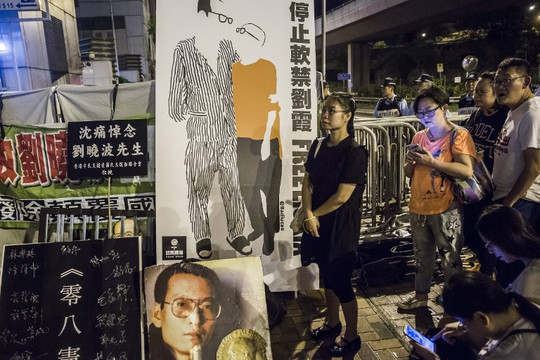The International Federation of Journalists (IFJ) regrets the death of veteran Chinese democracy advocate and Nobel Peace Prize laureate, Liu Xiaobo. Liu died on Thursday, July 13, after a battle with liver cancer. The IFJ condemns the Chinese Government’s actions leading up to his death, including denied medical care, holding his wife prisoner and not granting his family access during his final hours.Liu Xiaobo, 61, died at 5.30pm on Thursday, July 13, at the First Hospital of China Medical University in Shenyang, where he was receiving treatment on medical parole for terminal liver cancer. Liu’s death was not announced for four hours, when the hospital released a statement on his website. Two hours later at 11pm, the hospital arranged a press conference. During the press conference they explained how Liu’s medical condition had made it too dangerous for him to be transferred overseas for treatment. The hospital refused to answer questions about the delay in diagnosing Liu while in prison.Following Liu’s death, journalists and citizens alike reported disruptions and interference online and offline. Online, no one could post comments, opinions or simply ‘RIP’ on social media accounts. While several journalists reported having difficulties reporting on the story. The government did not respond to any media requests for comment, with other journalists reporting been sent on a wild goose chase, going from department to department for comment. Other journalists reported having hotel bookings declined near and around the hospital in Shenyang. After news of Liu’s death was released, leaders from the USA, France and the United Kingdom expressed their deepest condolences. For the first time since June 26, when Liu’s condition was first reported, state-owned media, Xinhua and China Central Television, reported on Liu. The Global Times also reported on his death, however use the opportunity to reiterate that Liu is a criminal and that western nations had politicised the case.Since Liu’s death, no information about his Liu Xia, who has been on home detention since his 2009 has been released. No details about a funeral or services have been announced.Several organisations have used Liu’s death to call on the Chinese Government and President Xi to immediately release Liu Xia from house arrest, and Xiaobo’s younger brother from prison, and grant them permission to travel overseas and leave China.Liu Xiaobo was a well-respected and veteran writer and dissident in China. Since his medical condition was made public, many have praised Liu and his commitment to democracy in China. Many friends and colleagues have noted the numerous offers and opportunities that Liu had to leave China and guarantee his safety and avoid political persecution. However, he repeatedly ignored these offers. In 1998, he returned to Beijing from the USA, where he was studying, to attend the Tiananmen Square protests, which was later accused of been an instigator of. In 2008, Xiaobo was one of the authors of ‘Charter 08’, which promoted democratic revolution in China. In 2009, he was arrested and charged with ‘subversion of state power’ for Charter 08 and sentenced to 11 year in prison.In 2010, Liu was awarded the Nobel Peace Prize, becoming the first Chinese citizen to be awarded the prize. However the authorities did not allow Liu or his wife to travel to Norway to accept the award.
The IFJ Asia Pacific Office said: “We express our deepest condolences to Liu’s family, friends and colleagues on his passing. Liu was a giant in the Chinese community and throughout his life continued to call on the government to endorse the human rights enshrined in the Constitution of China. Liu has the admiration of colleagues across the globe, in his persistent fight for democracy for China.”“The Chinese government have tirelessly worked to silence Liu, with his death serving as a stark reminder of the dire conditions those who speak out against the government face and live with. The actions of the Chinese government against Liu, and the other 60 other journalists and media workers jailed in China, show the lengths they will go to, to silence and suppress freedom of expression, opinion and movement.”The IFJ calls on President Xi to immediately release Liu Xia from home detention, and grant her and Liu’s brother permission to move overseas.For further information contact IFJ Asia-Pacific on +61 2 9333 0946
The IFJ represents more than 600,000 journalists in 140 countries
Find the IFJ on Twitter: @ifjasiapacific
Find the IFJ on Facebook: www.facebook.com/IFJAsiaPacific

